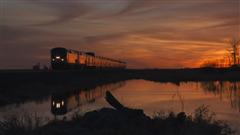|
|
||||
|
|
by Donald Levit  Fueled by G.I. Bill housing loans and rush to the suburbs, the post-World War Two boom witnessed mass highway building and the all-but-demise of long-distance passenger trains. Much of the rest of the world uses and improves often enviable and efficient rail systems, prompting Albert Maysles’ interest in documenting trains the world over. Filming In Transit, he experienced initial symptoms of the cancer that would end his life. Premièring in world documentary competition at the Tribeca Film Festival, this his fortieth, and last, is faithful to his and late brother David’s long, masterful Direct Cinema, unobtrusive fly-on-the-wall without director’s presence, voiceover, prompt questions, talking heads, identifications, title cards, scripts, heavy equipment or artificial lighting. On its surface a seventy-five-minute paean to the northern American Heartland through which the Empire Builder rolls Seattle to Chicago and back, the nation’s busiest long-distance route, the homey footage is as well a journey of varied humanity, different folks to and from different places for different strokes who “speak each other in passing in the night,” and then separate. They become family, the family of man, and reveal themselves fully as they would not in a more public and permanent environment. Such is what one expects from this iconic filmmaker who has had the magic to make others comfortable and draw them out. Given access freedom by Amtrak -- which in return receives priceless advertising -- and co-directors, -cinematographers and –producers attuned to his style -- Lynn True, Nelson Walker, Ben Wu and David Usui -- Maysles uses the train as metaphor for the journey of life, rail (usually ship) passengers and crew unified in human hopes and fears, strengths and weaknesses. True’s invisible editing -- the highest of compliments -- is seamless among passengers one on to another, as individuals apparently continents apart reveal their connectedness. Pregnant and three days overdue, an African-American pals with a Vietnam vet who has survived PTSD, alcoholism and a heart attack to make what he senses will be his final adventure. I shall not pass this way again. He photographs the woman and landscapes through the window and shows the viewer his last photo sight of the woman as she walks the Twin Cities platform to be embraced by relatives and friends. Death and birth. In his One twenty-three-year-old is leaving the lure of money and, slightly tipsy, nervously returning to a high school sweetheart not seen in years. A black man returns to his children but, in tears, needs the comforting words and handclasps of another who reminds him that he in turn will comfort others in the great chain of being. Off duty in the employees’ room, a conductor half-jokes about maybe delivering the baby -- “Push!”-- and in his compartment another gushes his satisfaction with his job, a lifelong dream. Their speaker announcements are informative but often as not no more than semi-heard background murmur. They, and others, are “ordinary,” easy to forget as individuals and, indeed, are invariably unnamed. “Smooth, relaxing and comfortable,” reads Amtrak about the rail experience of “the American Heartland west of the |
||
|
© 2025 - ReelTalk Movie Reviews Website designed by Dot Pitch Studios, LLC |



